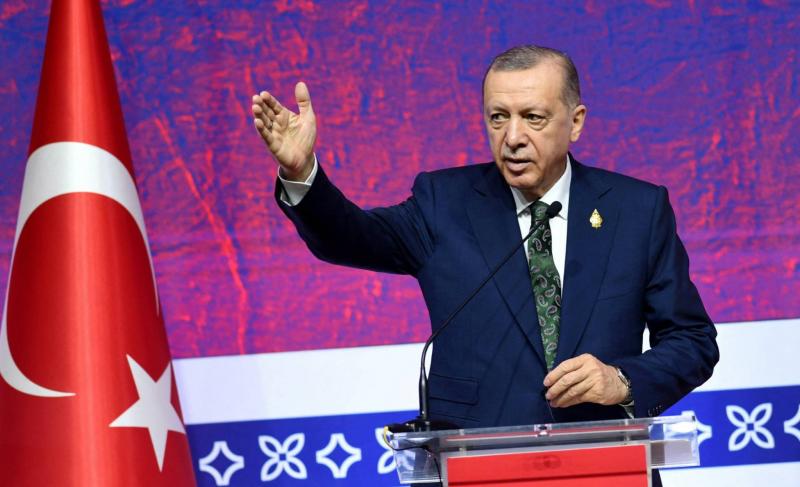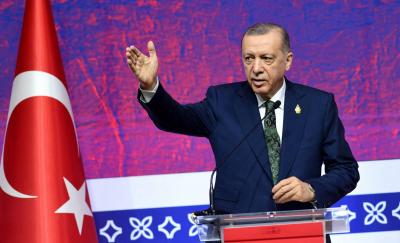Turkish President Recep Tayyip Erdogan made a comfortable advance in the first round of the presidential elections, while his opponent faces a challenging task to prevent him from extending his rule into a third decade in the runoff scheduled for May 28. Turkish assets fell after reports indicated that Erdogan received just under the 50% needed to avoid a runoff in the presidential elections, which are seen as a referendum on his authoritarian rule.
Erdogan's People's Alliance, which includes the Justice and Development Party with its Islamic roots and other nationalist parties, appears set to win a majority in the new parliament with 321 out of 600 seats, enhancing Erdogan’s chances in the presidential runoff. Erdogan stated in a speech to his jubilant supporters at the ruling Justice and Development Party headquarters in Ankara, “The winner is undoubtedly our country."
Ahmet Yener, the head of the Supreme Election Council, told reporters that with most votes counted in the presidential election, Erdogan secured 49.51%, while his main rival Kemal Kilicdaroglu received 44.88%. Voter turnout was reported at 88.8%.
Sinan Ogan, the nationalist candidate who finished third in the Turkish presidential election, stated in an interview with Reuters that he could only support Kilicdaroglu in the runoff if he agrees to make no concessions to a pro-Kurdish party, which favors Erdogan. This party, the Peoples' Democratic Party, supports Kilicdaroglu but is accused of ties to Kurdish militants, which the party denies.
Kilicdaroglu needs the 2.8 million votes that Ogan received in the first round if he is to defeat Erdogan. Pre-election polls indicated that Erdogan (69 years old) was trailing Kilicdaroglu. However, the results suggest that Erdogan and his party succeeded in rallying conservative voters despite the cost-of-living crisis and high inflation.
Kilicdaroglu, representing a six-party opposition alliance, promised to win in the runoff and accused Erdogan’s party of interfering with the counting and announcing of results, urging his supporters to be patient, though they seemed frustrated on Monday.
Volkan Atlican, sitting near a ferry terminal in Istanbul, expressed, “We feel sad and depressed about this entire situation. We expected different results. God willing, we will win in the second round.” In contrast, Erdogan's supporters appeared jubilant as the results were counted. Information security engineer Fayez Balko (23) stated he was confident in Erdogan's ability to solve the country’s economic issues. He added, “It is very important for Turks that Erdogan wins the elections. He is a global leader and all Turks and Muslims want to see him as president.”
An extension of Erdogan’s rule for another five years would raise concerns among civil rights activists who advocate for reforms to mitigate the damage they say he has inflicted on democracy. Erdogan has expressed respect for democracy. An opposition victory could pave the way for the release of thousands of activists and political prisoners.
Turkish stocks declined, the lira stabilized near a two-month low, dollar-denominated sovereign bonds fell, and the cost of insuring exposure to the country’s debt increased. Some analysts expressed concerns over the uncertainty and shrinking chances of a return to traditional economic policies. Wolfgang Piccoli, co-president of the consulting firm Teneo, stated, “Erdogan now enjoys a clear psychological advantage over the opposition. Erdogan is likely to increase his statements focusing on national security in the coming two weeks.”
The elections are closely monitored in Europe, Washington, Moscow, and across the region, where Erdogan has sought to consolidate his country’s influence while strengthening ties with Russia, leading to strained relations with its traditional ally, the United States. Erdogan is one of Russian President Vladimir Putin’s key allies, and his strong performance in the elections could bolster the Kremlin's position but provoke the ire of U.S. President Joe Biden’s administration and many leaders in Europe and the Middle East who have strained relations with Erdogan.
White House spokesperson John Kirby stated that President Joe Biden looks forward to working with whoever wins the Turkish elections. The Kremlin anticipated ongoing cooperation with Turkey and an increase in it regardless of the winner. Analysts noted that Middle Eastern governments prefer Erdogan's continuity over the election of a new president, viewing it as part of an acceptable status quo in a troubled region.
The opposition expected to capitalize on voter anger over economic issues after an unorthodox policy of reducing interest rates led to a lira crisis and high inflation. The government's slow response to the earthquakes that killed 50,000 people in February was also anticipated to impact voters.
Kilicdaroglu (74 years old) pledges to restore democracy following years of government repression, return to traditional economic policies, empower institutions that lost their independence during Erdogan's rule, and rebuild weakened ties with the West. The political landscape's uncertainty is expected to affect financial markets in the coming two weeks. The lira stood at 19.67 against the dollar as of 1348 GMT after reaching 19.70 in previous trading, which is its weakest level since recording 19.80 in March.
The cost of insuring against Turkey defaulting on its sovereign debt rose to a six-month high, jumping 105 basis points from Friday levels to 597 basis points, according to S&P Global Market Intelligence.




